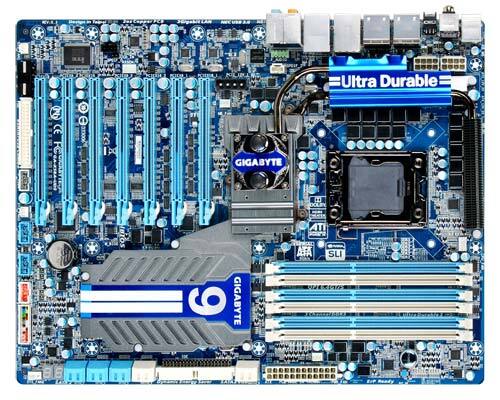Originally posted by DanL
View Post
Announcement
Collapse
No announcement yet.
Gigabyte's ASPM Motherboard Fix: Use Windows
Collapse
X
-
They told me that their technicians tested hardware with Windows, so if I sent my laptop to them to repair a Linux issue, they would send it back saying it worked. I assume that Microsoft's Windows license check is done against whatever disk they use for factory testing.Last edited by Shining Arcanine; 20 October 2011, 12:26 PM.
-
I have a Biostar (GeForce 6100 am2 (v1.x)) motherboard. I don't know whether it supports ASPM or not, but I wouldn't hope for them to release a BIOS that did. It works alright, but it has it's quirks (suspend isn't quite what you'd expect, and it displays a warning at every POST if you upclock anywhere beyond the base 200Mhz...whatever that means; actual processor speed doesn't seem to change).
They haven't updated the BIOS for this board since December 2007, and it was a beta version. Of course, the 3.x revision of the motherboard has a more recent (not beta) BIOS, but I dare not try to use it on my board....
Lessons learned: do (actual) research before you buy, and don't buy cheep. >_<
Leave a comment:
-
I've got several servers running Tyan mainboard. Due to my loath for nvidia products, they are ALL AMD chipsets. I've never had a problem with one of those boards, brutally stable. I've got a couple with uptimes pushing a decade.Originally posted by Qaridariumi do have a gigabyte mainboard right now but to read this about gigabyte makes me sad--
maybe i really buy supermicro or tyan next time.
i do have a Tyan mainboard in the past but the nvidia nfoce 3600 pro makes many trouble with the graphic driver and the bios do have tons of bugs like the 128gb first boot pardition bug if you have a pardition greater than 128gb it fails to start grub. also the bios do have a bug that force me to use ext3 or raiserfs it does not start with ext4...
but maybe the modern mainboards with amd chipset are much better than that.
Leave a comment:
-
Server mobos do need very short boot times. Shorter than Desktops actually
I can see why you would think that though, but obviously are around the enterprise server market and not in the embedded server market. Servers are EXACTLY where short boot times are needed. When you are using servers for embedded applications (like VoIP, CallCenters, etc), you want short boots to help you keep five 9's when you have to do a reboot for whatever reason. The current IBM uEFI/IMM based servers take around 5 minutes to start booting the OS.Originally posted by deanjo View PostUnfortunately, server motherboards are not really where 2 second boots are needed.
Cheers
Jeff
Leave a comment:
-
Unfortunately, server motherboards are not really where 2 second boots are needed.Originally posted by oliver View PostThis is exactly what coreboot wants to accomplish. It is far from where we want it to be, but several server motherboards run extremly well and boot in less then 2 seconds
Leave a comment:
-
This is exactly what coreboot wants to accomplish. It is far from where we want it to be, but several server motherboards run extremly well and boot in less then 2 secondsOriginally posted by marcello.dimarino View PostMaybe the solution is to some vendor support a way to reflash BIOS with some open BIOS. For sure the actual scenario we have is a lock down.
Leave a comment:
-
Maybe the solution is to some vendor support a way to reflash BIOS with some open BIOS. For sure the actual scenario we have is a lock down.
Leave a comment:
-
Not quite, MS has their own signature, every other entity would be responsible for their own signing. It is up to the UEFI vender to determine what signatures the UEFI will accept. Even if licensing issues where not a factor (but they are as well) it would still be up to those MB manufacturers to add acceptance to other signatures or to provide a toggle to disable the signature checking. Either way I do not put a lot of faith in motherboard manufacturers providing those options given their reluctance to even fix ASPM issues as well as provide any other data to kernel developers for their vender specific feature set.Originally posted by Wyatt View PostI think I heard the UEFI signing is done by MS, but please don't quote me on that....
Leave a comment:
-
Ya there is a couple of issues. First of all using a signed key could be seen as a form of DRM which has it's issuses with gpl code. Secondly the code verification would have to be done in a open manner which kind of defeats the purpose of signature protection.Originally posted by RealNC View PostIs there a reason why Linux can't provide signatures that allow installation?
Leave a comment:
-
the good point of gigabyte mainboard is the dual-bios they have on all mainboards .
the highest model of it with x58 , is very liked by those doing sli/crossfire with 3 cards or more @ 16x
this model also has radiators for chipsets ready to get in water cooling loop . that is a great good point and i never seen others doing that .
Lasting Quality from GIGABYTE.GIGABYTE Ultra Durable™ motherboards bring together a unique blend of features and technologies that offer users the absolute ...
for the rest , like all others motherboards makers , they have all prices and quality . benchmarks based on chipset show clearly that all brands have close results when no overclocking . overclocking leads intel boards to be last ;']
Leave a comment:



Leave a comment: